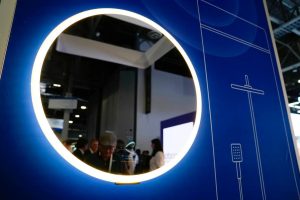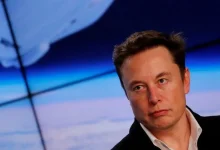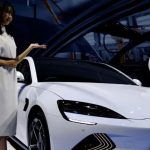Companies big and small showed off new AI-powered products and their AI-inspired visions for the future at the world’s biggest tech convention this week in Las Vegas.
There were pillows that can reduce snoring, mirrors that can detect your mood and innovations from pet-like companions to cars that integrate with viral chatbot ChatGPT.
But this year’s announcements hit differently from previous buzzy developments, such as the Metaverse or adding voice assistant technology to appliances. That’s because nearly every company appeared to be on the same page in 2024.
“It was an almost unanimous tethering to the AI theme … because it has infinite possibilities and a wide range of applications,” said Dipanjan Chatterjee, an analyst at market research firm Forrester.
Previous themes had “limited universal appeal,” he added.
Although CES is a hotbed for dealmaking among executives, manufacturers and retailers across various industries, it can also set the stage for some of the biggest tech trends of the year and shine a spotlight on how companies intend to be part of those conversations.
This year, non-tech companies including Walmart and L’Oreal held keynote presentations to discuss their AI visions for the future, which largely included adding generative AI solutions to help customers better find the products they want.
At the same time, Amazon gave updates on how some of its developers are integrating similar technology with their Alexa voice assistant. Even some automakers, such as Volkswagen, said they will be adding the viral chatbot ChatGPT to their lineups of cars later this year to help drivers control GPS, the infotainment system and options like heating and cooling, as well as to get answers to general questions.
“[These announcements] demonstrated how companies are first prioritizing customer needs and then figuring out how technology can best serve them,” Chatterjee said. “That’s a far cry from exhibiting cool tech in search of a use case.”

It’s also part of a larger shift happening at CES, from technology powering experiences to experiences powered by technology. To help further that change, chipmakers Nvidia and AMD unveiled new processors that will help run the next-generation of AI products.
Jitesh Ubrani, an analyst at market research firm IDC, agreed the chatter around CES felt unique this year as companies had a general understanding of “how ubiquitous and seamless AI will be in the coming years.”
“While many use cases are still unknown, what we do know is that no one wants to be left behind, so they’re starting to invest even before the products and use cases are fully fleshed out,” he said.
Beyond AI, other products stood out, too. Samsung wowed onlookers with the world’s first transparent MicroLED screen, which looks much like a floating sheet of glass. EssilorLuxottica showed off a prototype of its Nuance Audio eyeglasses that also feature built-in hearing aids. And Sony teased a mixed reality headset that can be controlled with a smart ring.
But considering CES 2024 was the first large-scale tech convention since the surge around AI last year, Eric Abbruzzese — a director at market research firm ABI Research — said “it’s no surprise AI was everywhere.”
He expects AI to dominate the tech world conversation not only throughout the rest of the year but beyond.
One caveat, however, is how the AI space will adapt to potential regulations, as government bodies and the White House aim to address the rapidly evolving technology.
“Should a regulation tamp down on AI growth in the name of privacy, security or if a big negative news event ties back to AI, then companies will work to shift messaging away – at least somewhat – from AI,” Abbruzzese said. “Even if their product is still using AI, the ultra-focused AI marketing may diminish.”








